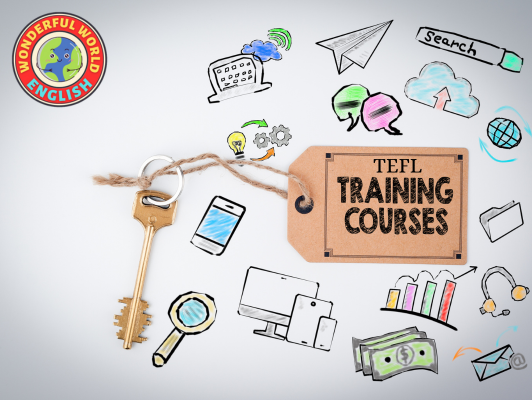Contents
Toggle
Meet David De’ Ath, founder, editor, and writer at Wonderful World English. With his extensive background as an English teacher, David provides valuable insights and practical tips on ESL for students and teachers alike.
Teaching English as a Foreign Language, commonly abbreviated as TEFL, is an educational pathway for those who want to teach English in non-native English-speaking countries.
The curriculum of a TEFL course is specifically designed to provide educators with comprehensive pedagogical knowledge and the practical skills required for effectively teaching language learners.
It covers a range of topics, from foundational teachings in grammar and vocabulary to the intricacies of fostering a conducive learning environment.
Participants in a TEFL program learn various instructional techniques to address students’ varying needs and learning styles.
They are trained in lesson planning, classroom management, and assessing student progress.
Moreover, a TEFL certificate can be a gateway to professional development, granting educators the qualification to teach abroad, find online teaching positions, and advance their careers beyond the traditional classroom setting.
Key Takeaways
- TEFL courses equip educators with the skills needed for teaching English to non-native speakers.
- These courses offer a deep dive into instructional strategies, lesson planning, and classroom management.
- Earning a TEFL certification enhances job prospects and professional development opportunities in the field of English language teaching.

Understanding TEFL and Its Importance
TEFL is a widely recognized qualification that equips individuals with the skills to teach English to non-native speakers.
Deepening the understanding of its foundations and purpose can unveil career paths globally and foster intercultural communication.
Basics of TEFL
TEFL, or Teaching English as a Foreign Language, is a certification course aiming at preparing educators to effectively teach English in a non-native English-speaking environment.
Accredited TEFL courses are designed to provide a comprehensive understanding of English grammar, teaching methodologies, lesson planning, and classroom management.
These skills are essential for those aspiring to become proficient EFL (English as a Foreign Language) teachers.
Significance of Teaching English as a Foreign Language
Teaching English as a foreign language holds significant importance due to English’s status as a global lingua franca.
A TEFL certification enables teachers to help students integrate into the global community, empowering them through improved communication skills and cultural understanding.
Fulfilling an accredited program not only establishes credibility but also provides access to teaching opportunities around the world.
Differences Between TEFL, TESOL, and TESL
While TEFL, TESOL (Teaching English to Speakers of Other Languages), and TESL (Teaching English as a Second Language) may seem similar, they cater to different teaching environments:
- TEFL prepares teachers to work in countries where English is not the primary language.
- TESOL focuses on teaching non-native speakers in English-speaking countries.
- TESL is more specific to teaching immigrants and their families within English-speaking countries.
Despite these differences, all aim to accredit educators with the necessary qualifications to teach English effectively, each with varying emphasis depending on the students’ needs and teaching context.
Accrediting bodies ensure that these certifications maintain high standards and relevance in an ever-evolving educational landscape.
Related: CELTA vs. TEFL vs. TESOL: Which One is Best?

Components of a TEFL Course
A TEFL certification course provides a comprehensive framework for teaching English as a foreign language.
It encompasses a variety of skills and knowledge areas critical for educators who aspire to thrive in diverse classroom settings.
Course Content and Structure
The structure of a TEFL course typically includes a series of modules that prepare educators for teaching English in non-native settings.
These modules cover a spectrum of pedagogical approaches and often incorporate different teaching methodologies.
Grammar Fundamentals
TEFL courses ensure that educators have a strong grasp of English grammar.
This core component involves detailed instruction on the rules and nuances of grammar, aiding teachers in delivering effective grammar lessons to ESL students.
Classroom Management Skills
Effective classroom management is essential for creating a productive learning environment.
TEFL courses provide strategies for maintaining discipline, engaging students, and managing classroom dynamics.
Language Skills Development
Instructors need to be adept in the four fundamental language skills: listening, speaking, reading, and writing.
A TEFL certification course covers methods to enhance these skills among learners of varying proficiency levels and backgrounds.
Lesson Planning and Execution
Mastering lesson planning is key to the TEFL curriculum, enabling educators to design and execute effective lessons.
TEFL courses teach the creation of structured plans that match objectives with appropriate teaching activities and assessments.

Professional Development through TEFL
A TEFL certification provides educators with a robust framework to enhance their teaching abilities.
It hones essential teaching skills and offers valuable experience, which is fundamental in fostering professional growth.
Gaining Practical Experience
TEFL courses equip educators with hands-on experience by often requiring them to engage in actual teaching sessions.
This direct exposure to classroom environments allows teachers to implement theory into practice and refine their techniques through real-world teaching situations.
They acquire an understanding of lesson planning, classroom management, and effective teaching methodologies.
Building Teaching Confidence
Confidence is critical in education, and TEFL courses play a significant role in fostering this trait in educators.
By confronting and overcoming the challenges of teaching English to non-native speakers, instructors nurture self-assurance.
Repeatedly practicing and receiving feedback on their teaching helps build a solid foundation of educational self-confidence.
Flexibility and Adaptability in Teaching Styles
Teachers who undergo TEFL training learn to adapt their instructional strategies to suit diverse learning environments and student needs.
The ability to tailor teaching styles is greatly emphasized, with a focus on flexibility and innovation, preparing educators to respond effectively to varied classroom dynamics and cultural differences.
Opportunities for Career Advancement
With a TEFL certification, teachers unlock global opportunities for career growth.
They can leverage their teaching abroad experience to ascend to higher positions within educational institutions.
Moreover, TEFL certification is a stepping stone for further professional qualifications and specializations, leading to a more dynamic and advanced teaching career path.
For a complete guide on TEFL certificates, check out the link below!
Related: TEFL Certificates: Your Guide to Teaching English Abroad

TEFL Certification and Job Prospects
TEFL certification equips individuals with the essential skills to teach English to non-native speakers and significantly expands their job prospects both domestically and internationally.
Requirements for TEFL Certification
To obtain a TEFL certification, individuals must fulfill certain educational prerequisites often set by the course provider.
Typically, these requirements include a high school diploma or equivalent, though some organizations may require a degree.
The certification process involves completing a TEFL course, which can vary in length but often entails at least 100 hours of instruction.
Online TEFL courses are also available, offering flexibility to cater to diverse learning preferences and schedules.
Types of TEFL Jobs
With a TEFL certificate, a variety of teaching positions become accessible. These include:
- Teaching English abroad in schools, ranging from public to private and language institutes
- Teaching English online, which allows for remote work opportunities
- Specialized roles such as business English instruction or private tutoring
The positions can vary widely in terms of classroom setting, student age groups, and curriculum focus.
Navigating the TEFL Job Market
The TEFL job market is dynamic, with opportunities available in countless countries, each with unique requirements and benefits.
TEFL salaries can vary significantly by location, institution type, and the teacher’s experience level.
Prospective TEFL teachers should conduct thorough research on job listings and seek reputable employers that provide clear contract details and support for international staff.
Considerations for Teaching Abroad
Teaching abroad is a rewarding experience, but it also comes with its own set of challenges.
Before embarking on this path, teachers should consider the following:
- Legal requirements such as visas and work permits
- Cultural and language differences
- TEFL certification cost and potential financial investment versus the expected salary
Teaching abroad requires careful planning, but for those who are prepared, it is an opportunity to immerse in a new culture while advancing one’s career.

Advancing Beyond the Classroom
A TEFL certification equips educators with diverse skills, enabling them to explore opportunities that extend far beyond traditional classroom teaching.
From specialized English courses to online tutoring, TEFL graduates are trained to address the needs of various learner demographics, including young learners, business professionals, and those preparing for English proficiency exams.
Teaching English Online and One-to-One
Educators can broaden their reach by teaching English online, offering personalized one-to-one instruction to both native and non-native English speakers.
Online courses are increasingly in demand, which allows for flexible scheduling and the ability to work with a global audience.
This digital landscape provides a platform for tailored English language instruction, focusing on individual student goals and learning styles.
Specializing in Teaching Business English
By specializing in Teaching Business English, instructors can target a niche market of professionals seeking to polish their language skills for the corporate environment.
A TEFL certification often includes business English modules that prepare educators to help learners navigate complex business communication, understand cultural nuances, and master specialist vocabulary.
Preparing Students for English Proficiency Exams
Instructors can also specialize in preparing students for English proficiency exams such as IELTS and TOEFL.
These standardized tests are crucial for non-native speakers pursuing education or career opportunities in English-speaking countries.
By focusing on exam techniques, practice tests, and essential language skills, TEFL-certified educators boost student confidence and success rates.
Continued Learning and TEFL Recertification
The field of teaching English as a foreign language is dynamic and requires continuous development.
TEFL recertification courses and resources provide ongoing education, keeping instructors up-to-date with the best teaching practices.
Continued learning opportunities also ensure that teachers remain effective and relevant, whether instructing young learners, business executives, or other diverse groups of English language learners.

Conclusion
In conclusion, TEFL courses serve as a comprehensive platform, equipping educators with essential pedagogical skills and practical experience necessary for the effective teaching of English as a foreign language.
The curriculum delves into the core aspects of language teaching, such as grammar and vocabulary, and emphasizes the importance of classroom management, lesson planning, and adapting to diverse learner needs.
Obtaining a TEFL certification opens a world of opportunities, allowing educators to embark on global teaching journeys, advance in their careers, and even explore specialized teaching domains such as business English or exam preparation.
With the TEFL field’s ongoing evolution, continuous learning and professional development remain crucial for educators to maintain their relevance and effectiveness in this dynamic and rewarding career path.
We hope you find value in this information; you can contact us if you require any support.
Have a wonderful day!
Image Attribution: All images licensed via canva.com





